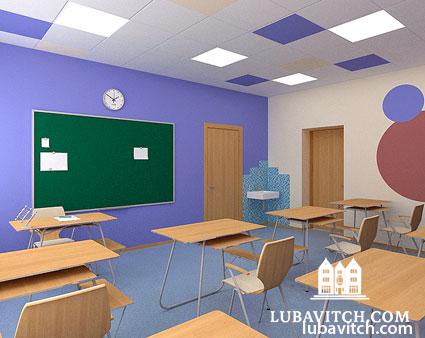(lubavitch.com) With the difficulties that Jewish communities everywhere are facing as philanthropic resources dry up, the completion this week of a new school building in the Ohr Avner network in Orenburg, Russia, was good reason for a celebration. The project reached its successful goal with the help of Chief Rabbi of Russia Berel Lazar, local officials, supporters and parents.
Guests toured the new building’s classrooms and computer center, and were treated to a special cultural program by the students which included a skit about Jewish life in Communist Russia.
Formerly a city preschool, the building was approved for sale to Chabad by Mayor Yuri Meshirikov after discussion and negotiations with the input of Rabbi Lazar. The facility gives the ten year old growing school of 200 students a new home where all its divisions from ages two to seventeen can be under one roof.
“Having all the students together in such a modern facility will help us tremendously in our efforts to revive Jewish education and Judaism in Orenburg,” said Rabbi Goel Mayers of Orenburg who started the school ten years ago when he first arrived. “The growth has been amazing. We started with a handful of kids.”
Orenburg’s only Jewish school, the Ohr Avner Chabad Day School enjoys a strong reputation after strong annual showings by its students in local academic competitions. Mrs. Kinneret Mayers introduced several students to the group and spoke about their development and progress in the school. Rabbi Lazar and Rabbi Mayers sat in on a few classes, observing the school’s curriculum, philosophy, and teachers in action.
“A lot of dedicated effort went into this project,” said Rabbi Mayers of the $2 million project backed by philanthropists Lev Leviev and Michael Miralashvili. “Despite the difficult financial times, we’ve worked hard and seen many miracles.”
The school’s completion celebration comes as the Ohr Avner school system, founded by Leviev in 1992 as a tribute to his father, deals with the challenges of world wide financial difficulties. The Orenburg school is part of the network of 75 day schools and 20 other programs across Russia which serves 13,000 students.
“Most of our schools are and continue to provide student scholarships,” said Rabbi David Mondshine, Director of the Ohr Avner Foundation. “We’re meeting the financial challenges with greater parent involvement, cutting back in areas that won’t impact quality, and in some schools we’re beginning to charge nominal fees for services like food and transportation.
Rabbi Mondshine told Lubavitch.com that the school opening is a bright spot among the financial difficulties of the past few months, and represents the conquering spirit of the Foundation’s schools which have revitalized Jewish education in Russia.
A modest city of about 850,000 residents, Orenburg is located in southeast Russia on the shores of the Ural River near the Kazakhstan border. Established in 1743 as a fortress, the city residents have included the author Pushkin, the Ukrainian writer Shevchenko, the famous musician Rostropovich, and the first Cosmonaut in the world, Gagarin.
Orenburg’s Jewish community, dating back to around 1806 counted about 1200 by the end of the century. When German occupation of Russia’s western regions flooded the area with Jewish refugees, the number grew significantly. Today, there are approximately 7,000 Jews living there.
Although many left after the war, the remnants formed the nucleus of the current Jewish community. Perestroika saw a steady stream of immigrants to Israel from the area which cooled off as the Russian economy strengthened, including large local oil and gas production refineries.
Chabad has played a major role in reviving Jewish life in the city which annually hosts two Jewish festivals: the “Peace Festival” and “the Festival of the Jewish Book”.
“There was nothing here Jewish when we came except a small, old synagogue that had a minyan only on Shabbat,” recalls Rabbi Mayers who arrived with his wife and 5 month old son from Israel after being appointed by Rabbi Lazar. “We started with a preschool right away and fixed up the synagogue, which now has a minyan every day.”
The Rabbi acknowledged they felt the financial crisis notwithstanding, the community is growing because of a strong and unwavering commitment to its wellbeing. “Given the tough situation, we are all working much harder to move along at a good pace.”

Be the first to write a comment.